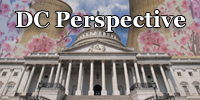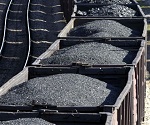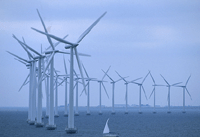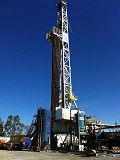Post-election outlook for nuclear energy
 In my September post at the ANS Nuclear Cafe, I discussed the Democratic and Republican party platforms, along with their potential impacts on nuclear energy. With the 2012 U.S. elections now behind us, this post provides a post-election follow up, and discusses the impacts of the election results on nuclear's prospects over the near- to mid-term.
In my September post at the ANS Nuclear Cafe, I discussed the Democratic and Republican party platforms, along with their potential impacts on nuclear energy. With the 2012 U.S. elections now behind us, this post provides a post-election follow up, and discusses the impacts of the election results on nuclear's prospects over the near- to mid-term.
With the reelection of Barrack Obama, and minor gains by Democrats in the House and Senate, the election results portend a continuation of the status quo, for the most part. Impacts of the election in various areas that may impact nuclear's prospects are discussed in the sections below.
Yucca Mountain
I've always taken great issue with the Obama administration's actions on Yucca mountain, and maintain that, at a minimum, the Nuclear Regulatory Commission licensing process should be finished, even if a political decision is made to not pursue the project. It is clear to most observers that the NRC technical staff (which had completed its review) was about to conclude that the repository met all the technical requirements, before the process was terminated near the finish line, for political reasons. The public has a right to know that Yucca would have met all the requirements, and that yes indeed there is a viable, acceptable technical solution to the nuclear waste problem.
 With the reelection of Obama and with (Democrat) Harry Reid remaining as Senate majority leader, the current status quo on Yucca Mountain will remain. Reid will continue to block funding for completion of NRC licensing, and the (Obama/Reid-appointed) NRC chair will likely cooperate with the effort to stop the process. As was the case before the election, whether the NRC will complete the licensing process will be primarily determined by the courts.
With the reelection of Obama and with (Democrat) Harry Reid remaining as Senate majority leader, the current status quo on Yucca Mountain will remain. Reid will continue to block funding for completion of NRC licensing, and the (Obama/Reid-appointed) NRC chair will likely cooperate with the effort to stop the process. As was the case before the election, whether the NRC will complete the licensing process will be primarily determined by the courts.
Yucca Mountain is one area where a Romney administration may have been more helpful to nuclear, but it's not clear whether there would have been any meaningful difference. Romney was also making anti-Yucca statements (such as "states should have the right to decide if they want the repository") during the campaign. Republicans winning the Senate would have made a far larger difference, as Reid would have lost the Majority Leader position, which is essential to his ability to block Yucca. On the other hand, if the president is not interested in changing the situation, even that may have not made much difference.
It seems that completion of the licensing process (the best we can hope for in the near term) is up to the courts at this point, and would have remained so regardless of who won the election. Also unclear is whether the lack of progress on the waste issue is having a significant effect on how much nuclear power there will be over the near-to-mid term. I've grown to believe that it is not as critical an issue as I formerly thought.
Fukushima-related upgrades and regulations
Whereas the anticipated regulations and required plant upgrades that will result from NRC's response to Fukushima will add costs for existing nuclear plants (and to a small extent, new plants), it is unlikely that the outcome of the election would have had any significant impacts on those regulations. No parties or candidates have made any significant statements on the NRC's actions in this area.
Nuclear plant loan guarantees
 The Obama administration had supported increasing the nuclear loan guarantee volume by a factor of several (to over $100 billion) but could not get it through Congress. On the other hand, the Obama administration has been dragging its feet in actually approving any loan guarantees, even for the Vogtle and Summer plants. With the current budget situation, any increase in loan volume is unlikely.
The Obama administration had supported increasing the nuclear loan guarantee volume by a factor of several (to over $100 billion) but could not get it through Congress. On the other hand, the Obama administration has been dragging its feet in actually approving any loan guarantees, even for the Vogtle and Summer plants. With the current budget situation, any increase in loan volume is unlikely.
It is unlikely, however, that Romney or the Republicans would have been better in the area of nuclear loan guarantees. Although the Republicans are ostensibly pro-nuclear, many in the Republican party are opposed to loan guarantees for any energy projects.
Finally, the overall impact of the nuclear loan guarantees is no longer clear. Indications are that other factors such as lack of power demand and low natural gas prices, as opposed to the lack of loan guarantees, are the primary reason that no plants other than Vogtle and Summer (and Watts Bar) are going forward. As for the Vogtle and Summer projects themselves, they appear to be going forward even without the government loan guarantees.
Climate change policies
Although the Obama administration is not planning to propose a cap-and-trade system or a carbon tax in the near future, Obama has stated that the nation needs to have a "conversation" about climate change, implying a desire to develop some type of policy.
 It seems clear that the chances of some type of policy or progress on climate change are far greater under Obama and the Democrats then they would have been under Romney and the Republicans, who had explicitly promised to block all such efforts. For example, the chances of the Clean Energy Standard policy (being debated and developed in Congress) moving forward would definitely be greater under the Democrats. Any type of climate change policy that creates a disincentive to emit CO2 would be tremendously beneficial to nuclear, particularly over the longer term.
It seems clear that the chances of some type of policy or progress on climate change are far greater under Obama and the Democrats then they would have been under Romney and the Republicans, who had explicitly promised to block all such efforts. For example, the chances of the Clean Energy Standard policy (being debated and developed in Congress) moving forward would definitely be greater under the Democrats. Any type of climate change policy that creates a disincentive to emit CO2 would be tremendously beneficial to nuclear, particularly over the longer term.
Although climate change had fallen off the agenda in recent years, and in the last election, there are reasons to believe that it will (again) rise in importance. Increasing numbers of Americans believe that climate change is a serious issue. As the economy improves, issues like the environment are expected to become more important in voters' minds. Also of note is the fact that even some conservative organizations are starting to consider a CO2 tax as a better approach than cap-and-trade, as well as a potential source of government revenue in lieu of increased income tax rates (as one example).
Election impacts on coal
It is clear that the reelection of Obama has hurt coal's future prospects. The coal companies themselves, as well as the stock market, confirm this. Coal company stocks fell substantially after the election, and some coal companies have laid off workers.
 Under Obama, the Environmental Protection Agency is in the process of significantly tightening up air pollution requirements, which would significantly impact the oldest (and dirtiest) coal facilities. To stay in operation, such plants would have to spend large amounts of money on air pollution controls. Given the current low cost of natural gas, these requirements will render those facilities uneconomic, and many are expected to close. With Obama's reelection, the EPA is also expected to proceed with a rule that requires all new power plants to emit no more CO2 than a typical gas-fired plant; a requirement that essentially precludes the permitting of any new coal plants.
Under Obama, the Environmental Protection Agency is in the process of significantly tightening up air pollution requirements, which would significantly impact the oldest (and dirtiest) coal facilities. To stay in operation, such plants would have to spend large amounts of money on air pollution controls. Given the current low cost of natural gas, these requirements will render those facilities uneconomic, and many are expected to close. With Obama's reelection, the EPA is also expected to proceed with a rule that requires all new power plants to emit no more CO2 than a typical gas-fired plant; a requirement that essentially precludes the permitting of any new coal plants.
In contrast, Romney (and the Republicans) campaigned on the promise to stop any tightening of air pollution limits, and perhaps even rolling requirements back. Their message was that they would act not only to keep existing coal plants open (including the oldest ones), but to increase the use of coal in the future. They emphatically opposed any efforts to reduce power-sector CO2 emissions.
With respect to any impact on nuclear's future prospects, policies that result in the closure of old coal plants would help, the only question being how much. Any retired coal-fired generation will be replaced by gas-fired generation (as opposed to nuclear), at least over the short to mid-term. Over the longer term, however, the resulting increase in gas demand will result in higher natural gas prices, which in turn would make nuclear more competitive.
Regardless of any impact they may eventually have on nuclear, these air pollution and global warming policies are the right thing to do, in my personal opinion. Nuclear professionals and advocates need to ask themselves why, specifically, they support nuclear, i.e., why it's important. Given our abundant reserves of coal (let alone gas), coupled with coal generation's low cost, the economic and energy security arguments for nuclear may appear relatively weak-if they come from someone who doesn't care so much about the environment, and therefore would have no problem with expanded fossil fuel use. The most compelling argument for nuclear (for me, anyway) has always been its environmental benefits. By extension, if one cares about air pollution and global warming, these policies are something to be celebrated, whether or not it is nuclear that replaces the old, dirty coal plants.
Wind tax credit
The reelection of Obama, and the Democrats' small gains in Congress, make it somewhat more likely that the (~2 cent/kW-hr) wind energy production tax credit will be extended, for at least some period of time. Romney had stated that he would seek to end the tax credit, whereas Obama supports it. Even now, however, it is not clear that it will be extended, given the great need to cut government spending. This is true despite the fact that many Republican lawmakers, from farm states mainly, support the tax credit.
 The wind power tax credit has some degree of negative economic impact on both new nuclear plant projects and existing plants. Wind often produces surges of power at times of very low power demand, which can actually lead to a negative market price for power over some time periods. The tax credit makes it still profitable to run the windfarms even under such conditions. These situations have a significant negative economic impact on existing nuclear generators in the region, which cannot shut down over short time periods. These problems are particularly acute in Illinois, where wind is being introduced and there is a large amount of nuclear generation (without much fossil generation that can be cut back in times of low wind demand). As a result, Exelon (the regional utility) has changed its position and is now opposing the extension of the wind power tax credit.
The wind power tax credit has some degree of negative economic impact on both new nuclear plant projects and existing plants. Wind often produces surges of power at times of very low power demand, which can actually lead to a negative market price for power over some time periods. The tax credit makes it still profitable to run the windfarms even under such conditions. These situations have a significant negative economic impact on existing nuclear generators in the region, which cannot shut down over short time periods. These problems are particularly acute in Illinois, where wind is being introduced and there is a large amount of nuclear generation (without much fossil generation that can be cut back in times of low wind demand). As a result, Exelon (the regional utility) has changed its position and is now opposing the extension of the wind power tax credit.
One final potential impact of the wind tax credit is that since it will result in more wind power, gas demand will be somewhat lower in the future, which may result in lower natural gas prices that would in turn make nuclear somewhat less competitive.
A legitimate issue that nuclear supporters should have with the wind tax credit is the question of fairness, i.e., why one non-polluting form of energy should benefit from large subsidies and (often) outright government mandates, whereas another, nuclear, does not. Yes, new nuclear plants also get a tax credit, but unlike with wind, the credit is limited to just the first few plants. Another issue is whether wind is being sufficiently penalized for its intermittent nature (producing power when it is least needed). Perhaps having the tax credit not apply during periods of very low demand, or some type of mechanism to support the electricity price during such glut periods, should be in order.
Natural gas
I have saved the best for last. Most experts agree that the single most important factor that affects nuclear's future prospects is the price of natural gas. If gas remains at current (very low) prices over the long term, not only will few, if any, new nuclear plants be built (beyond Vogtle and Summer), but even the continued operation of existing plants may be threatened.
 A perfect example of this is the recently announced closure of the Kewaunee nuclear plant. The plant lies within a "merchant" market, where the price of electricity is determined by the "last" supplier (highest variable cost), which is usually a gas plant. With the low price of natural gas, market prices for power in the region are very low. At current prices, Kewaunee is losing money. (This came as a shock to me, as the whole idea with nuclear is that whereas the initial capital cost is high, the operating cost, once built, is extremely low, low enough to easily compete with anything-or so I thought.)
A perfect example of this is the recently announced closure of the Kewaunee nuclear plant. The plant lies within a "merchant" market, where the price of electricity is determined by the "last" supplier (highest variable cost), which is usually a gas plant. With the low price of natural gas, market prices for power in the region are very low. At current prices, Kewaunee is losing money. (This came as a shock to me, as the whole idea with nuclear is that whereas the initial capital cost is high, the operating cost, once built, is extremely low, low enough to easily compete with anything-or so I thought.)
If anything, the reelection of Obama and the Democrats somewhat increases the chances that the price of natural gas will increase in the future. They are considering tightening regulations on the fracking process, to a greater extent than the Republicans would have (although neither party is showing a significant degree of interest). Also, as I discussed earlier, Obama's policies concerning coal (and perhaps global warming in general) can only lead to higher demand for gas, which would act to increase prices.
It seems that the common wisdom today is that natural gas prices will remain low for a very long time. Others have a different view, although they seem to be in the minority, at present. To me, it seems clear that gas prices will increase significantly in the future, at least from today's historic lows, for several reasons:
First, the cost of natural gas is extremely sensitive to the balance between supply and demand. As the economy improves, and gas demand increases (especially if large numbers of old coal plants are retired), gas prices will increase, a lot. Second, gas costs several times what oil does, on an energy equivalent (per BTU) basis. Given that these two fuels are supposed to be largely interchangeable, this situation cannot last. (Right now several proposals for using natural gas for transportation are being explored.) Third, natural gas costs 3-4 times as much (as current U.S. prices) in Europe and 5-6 times as much in Japan. This is also a situation that won't last, and plans are being made right now to export U.S. gas to world markets. And finally, today's natural gas prices are far lower than what it actually costs to extract the gas (about half, actually), and producers are losing money hand over fist. This, again, is a situation that cannot last.
Summary
The election results largely preserve the status quo concerning policies that affect nuclear and energy in general. So, as to whether or not Romney and the Republicans would have been better or worse for nuclear, it's a mixed bag of offsetting effects. In any event, few new nuclear plant projects are expected over the short term due to the current low price of natural gas in the United States. Over the longer term, nuclear's future looks significantly brighter, especially if a serious global warming policy is (eventually) implemented.
___________________________________

Hopf
Jim Hopf is a senior nuclear engineer with more than 20 years of experience in shielding and criticality analysis and design for spent fuel dry storage and transportation systems. He has been involved in nuclear advocacy for 10+ years, and is a member of the ANS Public Information Committee. He is a regular contributor to the ANS Nuclear Cafe.







